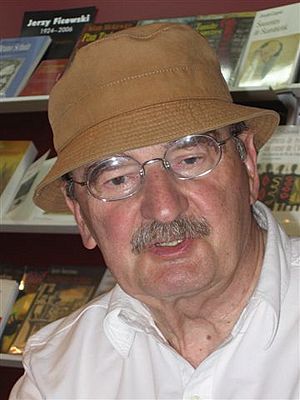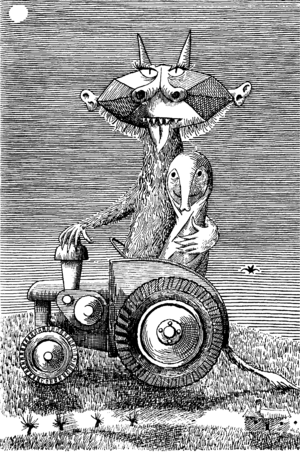Sławomir Mrożek facts for kids
Quick facts for kids
Sławomir Mrożek
|
|
|---|---|

Warsaw, 21 May 2006
|
|
| Born | 29 June 1930 Borzęcin, Poland |
| Died | 15 August 2013 (aged 83) Nice, France |
| Occupation | Dramatist, writer |
| Nationality | Polish |
| Citizenship | Polish, French |
| Notable works | Tango The Police |
| Notable awards | Kościelski Award (1962) Austrian State Prize for European Literature (1972) Legion of Honour (2003) Grand Cross of the Order of Polonia Restituta (2013) |
| Signature | |
Sławomir Mrożek (born June 29, 1930 – died August 15, 2013) was a famous Polish writer, playwright, and cartoonist. He was known for his unique and often funny plays.
Mrożek joined the Polish United Workers' Party, which was the main political party in Poland at the time. He started his career writing about politics for newspapers. In the late 1950s, he began writing plays. His plays are often called "absurdist fiction." This means they use strange or unrealistic events to make a point. They often made audiences think about politics and history in new ways.
In 1963, Mrożek moved away from Poland to live in Italy and France. He later lived in Mexico for a while. In 1996, he came back to Poland and lived in Kraków. He moved back to France in 2008. Sławomir Mrożek passed away in Nice, France, when he was 83 years old.
Contents
Early Life and Career Beginnings
Sławomir Mrożek's family lived in Kraków during World War II. He finished high school in 1949. In 1950, he started his writing career as a political writer for a magazine called Przekrój.
In 1953, during a difficult time in Poland, Mrożek signed a letter. This letter supported the government's actions against some religious leaders. He later moved to Warsaw in 1959. In 1963, Mrożek traveled to Italy with his first wife, Maria Obremba. They decided to stay there. After five years in Italy, he moved to France. He became a French citizen in 1978.
After leaving Poland, Mrożek became critical of the Polish government. He also spoke out against the 1968 invasion of Czechoslovakia.
His first wife, Maria Obremba, died in 1969. Later, in 1987, he married Susana Osorio-Mrozek from Mexico. In 1996, he returned to Poland and settled in Kraków. In 2002, he had a stroke, which affected his ability to speak. It took him several years to recover. He left Poland again in 2008 and moved to Nice, France. Sławomir Mrożek died in Nice on August 15, 2013. He was buried in Kraków in September 2013.
Exploring Mrożek's Plays
Mrożek's first play, The Police, was published in 1958. His first full-length play was Tango (1965). This play was about totalitarianism, a type of government where one person or group has total control. Tango used the style of the Theatre of the Absurd. This made Mrożek one of the most famous Polish playwrights around the world. Tango became his most successful play, performed in many countries.
In 1975, his second popular play, Emigranci (The Émigrés), was produced. It was a story about two Polish people living in Paris. Mrożek traveled to many European countries. After a time of military rule in Poland in 1981, Mrożek wrote a play called Alfa. This play was about the imprisoned leader of the Solidarity movement, Lech Wałęsa. Productions of Alfa and two other plays were banned during this time.
Mrożek's plays were often called "absurd" because the times people lived in often felt very strange and illogical.
List of Mrożek's Works
Here is a list of plays written by Sławomir Mrożek:
- Professor / The professor
- Policja / The Police, "Dialog" 1958, nr 6
- Męczeństwo Piotra Oheya / The Martyrdom of Peter Ohey, "Dialog" 1959, nr 6
- Indyk / The Turkey, "Dialog" 1960, nr 10
- Na pełnym morzu / At Sea, "Dialog" 1961, nr 2
- Karol / Charlie, "Dialog" 1961, nr 3
- Strip-tease, "Dialog" 1961, nr 6
- Zabawa / The Party, "Dialog" 1962, nr 10
- Kynolog w rozterce / Dilemmas of a dog breeder, "Dialog" 1962, nr 11
- Czarowna noc / The magical night, "Dialog" 1963, nr 2
- Śmierć porucznika / The death of the lieutenant, "Dialog" 1963, nr 5
- Der Hirsch, trans. Ludwik Zimmerer (in:) STÜCKE I, Berlin (West), 1965 (no Polish version)
- Tango, "Dialog" 1965, nr 11
- Racket baby, trans. Ludwik Zimmerer (in:) STÜCKE I, Berlin (West), 1965 (no Polish version)
- Poczwórka / The quarter, "Dialog" 1967, nr 1
- Dom na granicy / The house on the border, "Dialog" 1967, nr 1
- Testarium, "Dialog" 1967, nr 11
- Drugie danie / The main course, "Dialog" 1968, nr 5
- Szczęśliwe wydarzenie / The fortunate event, "Kultura" 1971, nr 5
- Rzeźnia / The slaughterhouse, "Kultura" 1971, nr 5
- Emigranci / The Émigrés, "Dialog" 1974, nr 8
- Garbus / The Hunchback, "Dialog" 1975, nr 9
- Serenada / The Serenade, "Dialog" 1977, nr 2
- Lis filozof / The philosopher fox, "Dialog" 1977, nr 3
- Polowanie na lisa / Fox hunting, "Dialog" 1977, nr 5
- Krawiec / The Tailor (written in 1964) "Dialog" 1977, nr 11
- Lis aspirant / The trainee fox, "Dialog" 1978, nr 7
- Pieszo / On foot, "Dialog" 1980, nr 8
- Vatzlav (written in 1968), published by the Instytut Literacki (Literary Institute in Paris)
- Ambassador / The Ambassador, Paris 1982
- Letni dzień / A summer day, "Dialog" 1983, nr 6
- Alfa / Alpha, Paryz, 1984
- Kontrakt / The contract, "Dialog" 1986, nr 1
- Portret / The portrait, "Dialog" 1987, nr 9
- Wdowy / Widows (written in 1992)
- Milość na Krymie / Love in the Crimea, "Dialog" 1993, nr 12
- Wielebni / The reverends, "Dialog" 2000, nr 11
- Piękny widok / A beautiful sight, "Dialog" 2000, nr 5
English Translations of His Works
Some of Sławomir Mrożek's works have been translated into English:
- Tango. New York: Grove Press, 1968.
- The Ugupu Bird (selected stories from: Wesele w Atomicach, Deszcz and an excerpt from Ucieczka na południe). London: Macdonald & Co., 1968.
- Vatzlav. London: Cape, 1972.
- The Elephant (Słoń). Westport: Greenwood Press, 1972.
See also
 In Spanish: Sławomir Mrożek para niños
In Spanish: Sławomir Mrożek para niños
 | Frances Mary Albrier |
 | Whitney Young |
 | Muhammad Ali |


